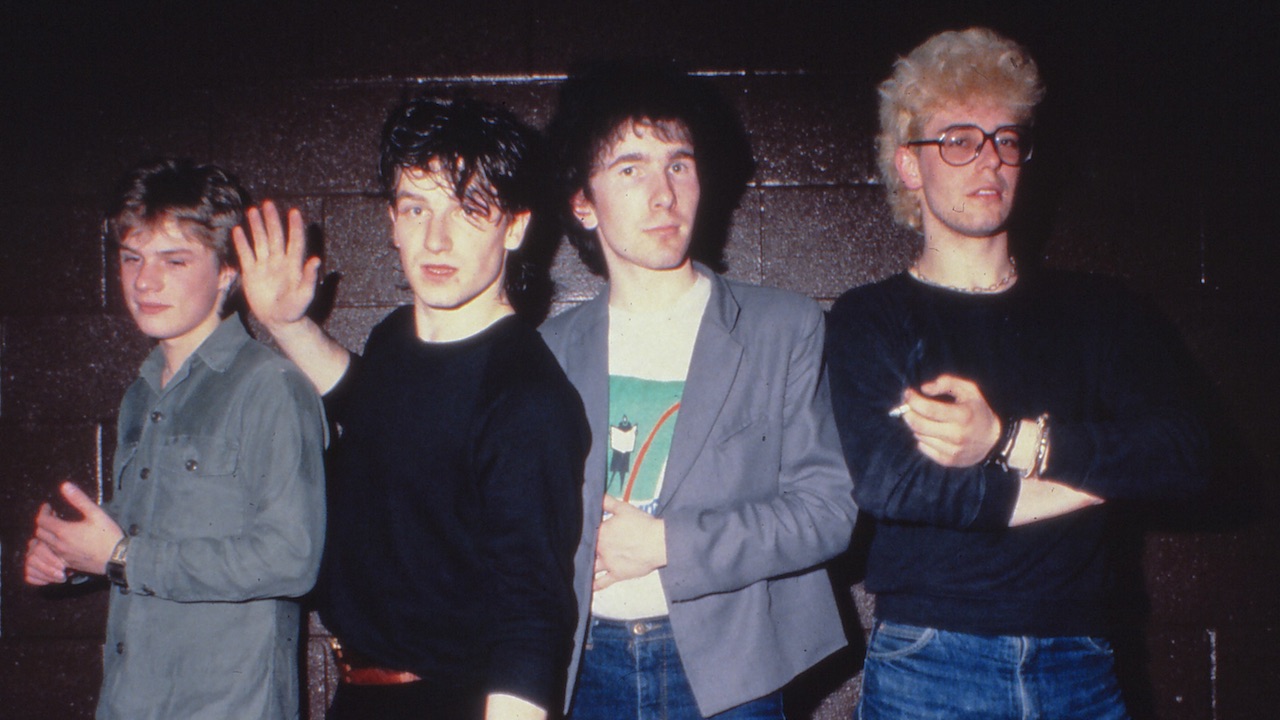"Edge left. He was feeling that he couldn't serve both god and man. I decided I couldn't either. So we both quit." How Bono and The Edge's faith in Jesus almost destroyed U2
Fears that Christianity was incompatible with life in a rock band caused much soul-searching for U2 in the early '80s, and almost led the band to break up

Spirituality has always been at the core of U2's music, but early on in the Dublin band's career, some members of the group started to question whether their Christian faith might be incompatible with life in a rock band. In fact, during the recording of the quartet's second album, October, both vocalist Bono and guitarist The Edge considered walking away from the band forever.
U2 began working on their second record in the spring of 1981. The Edge remembers it being "a really dark time", with songs coming together painfully slowly, and Bono seriously struggling for lyrical inspiration. The quartet's debut album, Boy, had sold respectably, but hadn't set the world on fire, and the knowledge that their record label expected album two to elevate the band to a higher level weighed heavily on the young musicians.
The stress and tension the quartet felt while working at Dublin's Windmill Lane studios was exacerbated by the fact that there were individuals close to three of the four band members who were trying to encourage them to abandon the idea of pursuing a career in the music industry. Bono, The Edge and drummer Larry Mullen were members of the Shalom Fellowship, a small, non-denominational Christian community group with hardline ideas about how its members should dedicate their lives to Jesus Christ, and, at the regular meetings, some within the fellowship expressed their opinion that chasing dreams of rock stardom wasn't what the Lord would have wanted for the three young men.
In the band's official biography, U2 by U2, The Edge sums up the quandary the trio were in by saying that they were trying to reconcile "completely contrasting imperatives".
"On one level to try and be as true on a spiritual front as we could be, and then on the other level to be in the best rock n' roll band we could ever be in. So there was an element of uncertainty going forward."
"Edge left the band," Bono recalls. "But he didn't tell the band, he just told me, and I wasn't interested in being in the band if he wasn't. He was saying: 'This is great what we're doing, but there is another world out there and that's what I want to be part of. And the real cure to the world's ills does not lie in a post-punk rock band'."
"Edge left the band, I left the meetings," Larry Mullen remembered.
The Edge spoke about his crisis of faith in a 1992 interview with Musician magazine.
"I didn't actually leave the band," he claimed, "but there was a two-week period where I put everything on hold and I said, Look, I can't continue in my conscience in this band at the moment. So hold everything. I want to just go away and think about this. I just need a couple of weeks to reassess where I'm headed here and whether I can really commit to this band or whether at this point I just have to back out. Because we were getting a lot of people in our ear saying, 'This is impossible, you guys are Christians, you can't be in a band. It's a contradiction and you have to go one way or the other.' They said a lot of worse things than that as well.
"I was just sort of sick of people not really knowing and me not knowing quite whether this was right for me. So I took two weeks. Within a day or two I just knew that all this stuff was bullshit."
Before he came to this conclusion however, he and Bono shared their misgivings with Adam Clayton, the group's committed agnostic, manager Paul McGuinness, and producer Steve Lillywhite. In U2 by U2, Clayton admits that the conversation was "a shock".
Paul McGuinness too was knocked sideways by the revelation, not least because he had already booked a major new tour for the group. He remembers leaving the studio, and walking around the block, trying to make sense of what he was hearing. When. he returned to the discussion, he had a clear message to impart to his young charges.
"I came back and I said, Look, quite honestly, if God had something to say about this tour he should have raised his hand a bit earlier because, in the meantime, we've booked a big crew and made commitments to people, and, in my view, you're obliged to follow through on them."
Soon enough, the group got back to work. But, perhaps unsurprisingly, October, when it emerged, was an album heavily themed around questions of faith.
"We had this notion, early on, that we didn't want to be the band that talks about God," said Bono, "but then we made an album that spoke of little else."
"We never did resolve the contradictions," The Edge admitted to Musician. "And probably never will."
The latest news, features and interviews direct to your inbox, from the global home of alternative music.

A music writer since 1993, formerly Editor of Kerrang! and Planet Rock magazine (RIP), Paul Brannigan is a Contributing Editor to Louder. Having previously written books on Lemmy, Dave Grohl (the Sunday Times best-seller This Is A Call) and Metallica (Birth School Metallica Death, co-authored with Ian Winwood), his Eddie Van Halen biography (Eruption in the UK, Unchained in the US) emerged in 2021. He has written for Rolling Stone, Mojo and Q, hung out with Fugazi at Dischord House, flown on Ozzy Osbourne's private jet, played Angus Young's Gibson SG, and interviewed everyone from Aerosmith and Beastie Boys to Young Gods and ZZ Top. Born in the North of Ireland, Brannigan lives in North London and supports The Arsenal.

